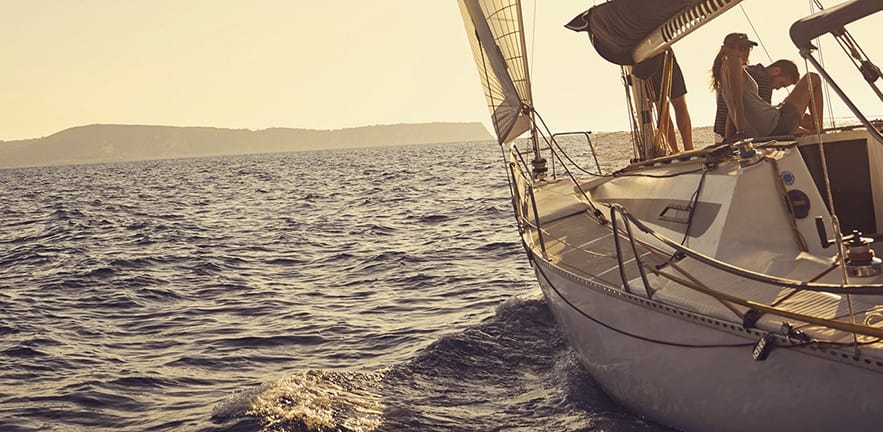Ex-Army Officer and Cambridge Judge Fellow Tim McEwan says there are many parallels between business leadership and skippering a yacht on the ocean.


Army officer. Atlantic yacht skipper. Businessman. It’s fair to say that Tim McEwan knows a thing or two about leading teams in challenging circumstances. “Whether you’re at the helm of a business or an ocean-going yacht the secret to leadership is the same,” he says. “Maintaining a calm, assured, outward projection is absolutely vital – and never more so than when you have absolutely no idea what to do next!”
Today, McEwan’s leadership consultancy firm, TMD International, advises the current and next generation of leaders and, as a Fellow in Management Practice, he works with clients on Cambridge Judge Business School’s Executive Education programmes. Tim says that he draws much of his insight from his time at sea.
McEwan’s sailing log is impressive and includes sailing a Nicholson 55 from Cape Town to Rio and taking part in a 1,200 mile race – as half of a crew of just two – from the Azores to Falmouth. “So many sailing experiences equate to leading a business,” he says. “Anticipating what will happen next so nothing ever catches you out. Practicing jibing your spinnaker so when you do it in a race you’re ready, making sure everyone knows what their jobs are so when those choppy waters come, you’re prepared. Plan for those moments, or you’ll just lurch from crisis to crisis.”
And a calm captaincy, he says, is key. “There are only ever two occasions when a skipper needs to shout – if you genuinely cannot be heard above all the noise, or if life is in imminent danger. Apart from that, there’s no excuse to yell at all.”
Since his schooldays, McEwan has been drawn to life at the helm: “I was always leading things. I led a young enterprise company and many activities and committees” – so it’s no surprise that after training at the Royal Military Academy Sandhurst he became a platoon commander in the Scots Guards, as well as equerry to the Duke of Kent, before becoming a military instructor back at Sandhurst.
“I was fascinated by leadership and particularly the art of it,” he says. “I am passionate about translating and sharing knowledge and how you can most effectively do that.”
After 10 years in the Army (he remains a trustee of the Sandhurst Trust), McEwan became a leadership consultant and then global head of leadership and development, Henderson Global Investors.
Along the way he learned a few lessons himself. “The art of teaching is simplicity underpinned by rigour and deep knowledge. People want to walk away feeling intellectually challenged but, importantly, with two or three things they can implement on Monday morning. Our job is not to teach everything we know but to use our experience and knowledge to help our clients work out what they need to know, and teach them that.”
And, throughout, he has maintained a passion for seamanship that began as a schoolboy when he sailed around the islands off the west coast of his native Scotland. “It was challenging and beautiful,” he recalls. “By comparison sailing the south coast of England is easy. In Scotland it’s a demanding environment in all respects.”
Those skills have stood him in good stead ever since as he has helped hundreds of people steer their way through the challenges of organisational leadership. “On a boat you soon learn the number one lesson is to maintain your crew’s morale however you can. You need skill and emotional intelligence to identify people who are beginning to feel the strain, and help them to manage it. And of course there’s that calmness. There’s an Army saying that officers don’t run because it frightens the men. If you flap like a windsock at the first hint of trouble your team will ask: “Should we be flapping too? This must be bad.”
But McEwan, a regular conference chair and speaker on leadership who remains a special advisor to Henderson Global Investors, says there is one aspect of sailing that does not just inform his teaching, but is pertinent to his whole life.
“I’ve come to learn that the cornerstone to everything we do is balance,” he says. “When people ask me for leadership answers they expect (or want) the solution to be X or Y. I tell them it’s neither of those – it’s both. Leadership and life is about balancing the sails, evenly distributing the breeze through them. As a skipper you need, among other qualities, a degree of grip and the same degree of compassion. How and when you use them, and to what degree, is a judgment call made in the moment with all the various factors contributing to it – and only the leader can make that judgement. Finding that balance will serve you well in everything.
“When I was in the Army I was lucky enough to be part of a downhill ski racing team. I was never any good at it because it required you to find the balance between being in control and bring totally out of control. I could never find that balance and always opted for remaining in too much control and therefore was not fast enough. It is supremely difficult but, if you achieve it, you are progressing as effectively and as fast as you can.
“It’s the same with sailing, with leadership and with everything. But it’s not enough just to find that balance. You have to maintain it, working really hard to stay balanced while life tries to throw you off-kilter. Only then can you steer your most effective course.”

